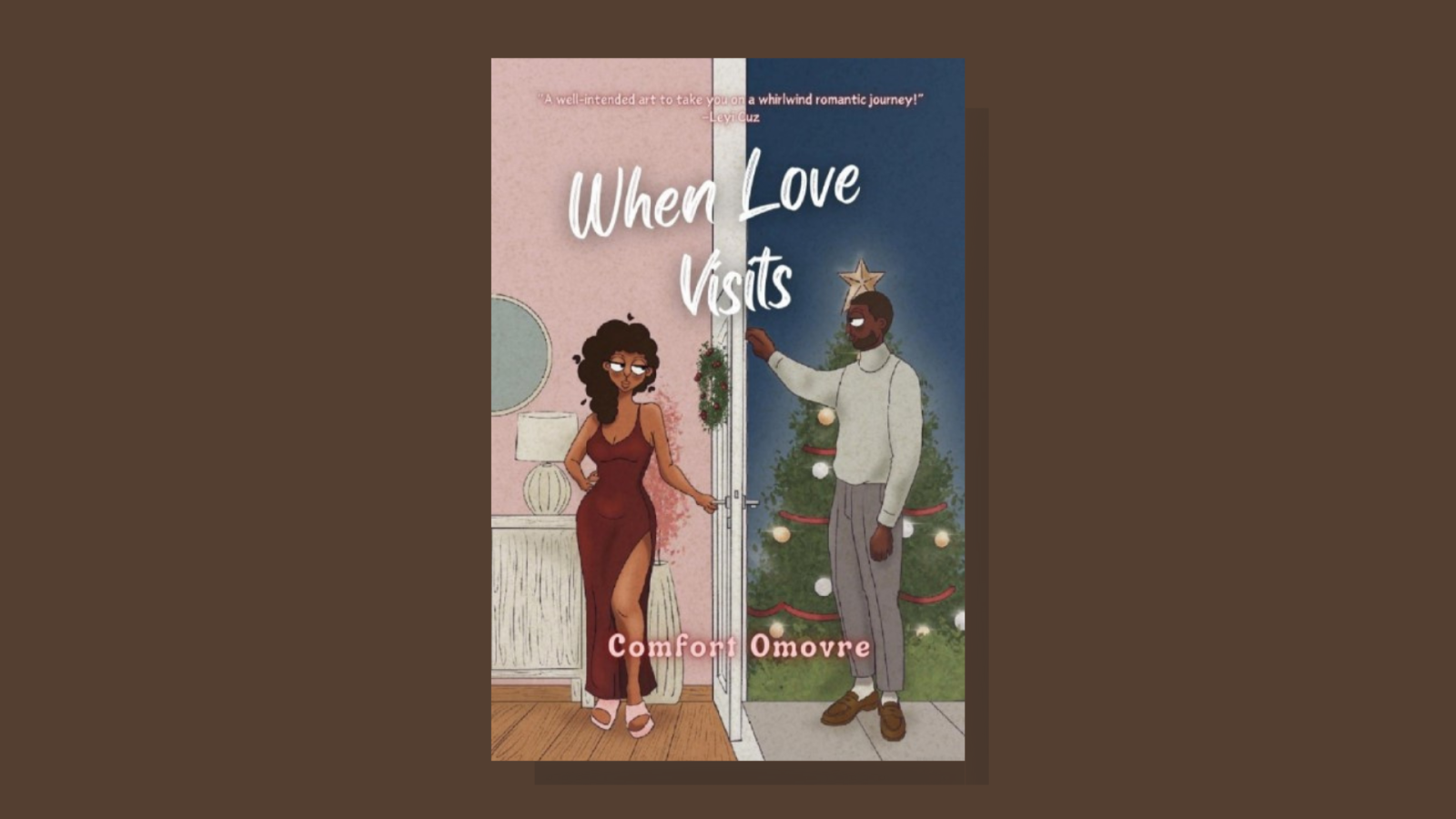When Love Visits is undoubtedly a pleasurable read. Much of its appeal lies in how effectively it transports the reader away from the current often insufferable reality of being Nigerian and living in Nigeria.
By Evidence Egwuono Adjarho
There has been a noticeable rise in Nigerian indie romance authors, particularly in the 21st century. This trend is unsurprising, given that the romance genre has long existed alongside the broader tradition of literary writing. From Western authors to African writers, romance is by no means new to the literary landscape.
However, within African literature, romance is often dismissed as unserious—viewed as a genre suited only for a specific audience, typically those considered to have little scholarly or critical engagement with literature. This perception may partly explain why Nigerian indie romance authors rarely receive the same recognition as writers of other genres.
Nevertheless, the emergence of social media book influencers, popularly known as BookTokers and Bookstagrammers, has given this genre increased visibility within the reading culture. This isn’t to say that prevailing stereotypes have been overturned. Rather, it suggests that romance fiction is reaching wider audiences, perhaps due to the sheer enjoyment it offers. But this brings us to a deeper question: can a work still be considered good literature if it offers no room for engagement beyond surface-level pleasure?

When Love Visits by Comfort Omovre is a novel that follows the lives of two central characters, Tade and Uju, in their quest for love and meaningful connection. Tade is a billionaire tech entrepreneur based in the United States and the son of wealthy Nigerian elites. His parents, Mrs. Olamitide and Mr. Olumide, have accumulated what is commonly referred to in Nigerian parlance as “generational wealth”, enjoying all the privileges that come with such affluence. Uju, on the other hand, is a thriving businesswoman and one of the top three event planners in West Africa.
From the opening chapter, When Love Visits introduces readers to Uju’s world with a tone that immediately hints at emotional complexity. The narration attempts to clarify that Uju is not “a psycho on a short fuse who had had to take anger management classes”, but this denial inadvertently reinforces the suspicion of underlying instability. As a result, a sense of disorder emerges around Uju, mirrored by the reader’s confusion. Although it is clear that something significantly disturbing has occurred in her life, the book withholds specific details, opting instead for a slow reveal.
This narrative pacing shapes an early perception of Uju—a negative one—within the first few pages. Consequently, as her character develops, it begins to feel like an inconsistency in her arc.
After an impromptu cancellation of a wedding that would have occupied Uju throughout the Christmas season, she suddenly finds herself with free time and no work-related commitments. Encouraged by her close-knit circle of six friends, she begins to reflect on the possibility of love: “For the first time, she found herself wondering what it would feel like to actually experience love this Christmas. Would it truly happen to her if she gave it an honest chance?”
Meanwhile, Tade returns to Nigeria to spend Christmas with his family. Unlike his usual brief visits, he decides to stay longer this time, and more significantly, to open himself up to love after three years of being single. His decision to settle down surprises and delights his best friend, Benjamin, who was initially introduced as his driver.
By the third chapter of When Love Visits, the reader is already reminded of a hallmark feature of classic Nollywood films particularly those produced in the early 2000s: the ease with which one can predict the plot trajectory and eventual conclusion from the onset. Perhaps it is the juxtaposition of two adults, both open to love during the festive season, or the familiar romance trope of a young and exposed billionaire falling for a somewhat naive woman of lower social status. Whatever the reason, the book strongly hints at a forthcoming romance between Tade and Uju. And rightly so.

They meet at a bar, one recommended by Uju’s friends and coincidentally chosen by Tade and his circle. While at the bar, Uju is harassed by a man attempting, quite desperately, to woo her despite her clear disinterest. She is rescued by a woman who, at the time, is a stranger. This woman later turns out to be Bolanle, the wife of Tade’s best friend, Benjamin. Bolanle invites Uju to join their table, noticing that she came alone. There, Uju is introduced to the group but even before formal introductions, a mutual interest between her and Tade has already sparked. Their chemistry is immediate and unmistakable.
“What I love the most about this book is how it doesn’t pretend to be anything other than Nigerian!” So were the exact words of one reader of When Love Visits. Yet, for a novel praised to be very Nigerian by what seems to be a hasty reviewer in such a zestful fit to impress, When Love Visits is mostly nowhere near that.
To begin with, although the novel is set in Nigeria, the only elements that suggest this are the familiar locations such as Ikoyi and Banana Island and the use of Nigerian names. Beyond these surface-level markers, one begins to question who When Love Visits is truly written for. It may be excused that nearly every character is deeply connected to the Western world which is a common trope for wealthy characters: Tade is a U.S. citizen with a biracial mother; Uju’s friends are scattered across Europe; most of her siblings live abroad. However, in the one area where authenticity cannot be compromised—cultural depth and rootedness—the book fails woefully.
The language in When Love Visits often feels like a forced attempt at capturing Nigerian English. Many sentences are peppered with familiar Nigerian expressions such as “jhor”, “wahala”, “abeg”, “nko”, and so on. However, these words are frequently italicised throughout the novel, making them feel foreign and out of place. Still, this is not the core issue.
What stands out more problematically in When Love Visits is the treatment of expressions that are already mutually intelligible to most Nigerians. Take, for example, the widely used acronym IJGB. Rather than allowing its cultural resonance to speak for itself, When Love Visits inserts long, explanatory sentences like: “I.J.G.B was an acronym for ‘I Just Got Back’, and was used to refer to Nigerian-Diasporas who often came home for the Christmas holidays. The men had a reputation for pursuing love interests just to keep their bed warms for the length of their brief stay. Soon as they left the country, that whirlwind romance was quickly forgotten. Sometimes, they got renewed the year after, but most times, never again.”

Explanations like this, though perhaps useful to a non-Nigerian reader, dilute the cultural richness these expressions carry. Over-explaining what is already embedded in shared understanding causes the writing to lose the very flavour that makes Nigerian writing distinctive.
When Love Visits is undoubtedly a pleasurable read. Much of its appeal lies in how effectively it transports the reader away from the current often insufferable reality of being Nigerian and living in Nigeria. The novel immerses you in a fairytale-like world where two lovebirds meet and connect in a way that elicits the warm, sentimental “Aww, so this is love” reaction. You may even find yourself clinging to the fantasy it offers, long after turning the final page.
But that’s where it ends.
There is little substance to hold onto once the story concludes. As reality inevitably creeps back in, you shrug off the novel’s dreamlike charm, reminding yourself that “these things only happen in books”. The story fades quickly, becoming another Cinderella tale we once believed in, but no longer do.
Evidence Egwuono Adjarho is passionate about African literature and is committed to amplifying its reach through book reviews and engaging video content. She is currently training as a photographer. Connect with her on Instagram, X, Facebook, and LinkedIn: @evidence egwuono.



